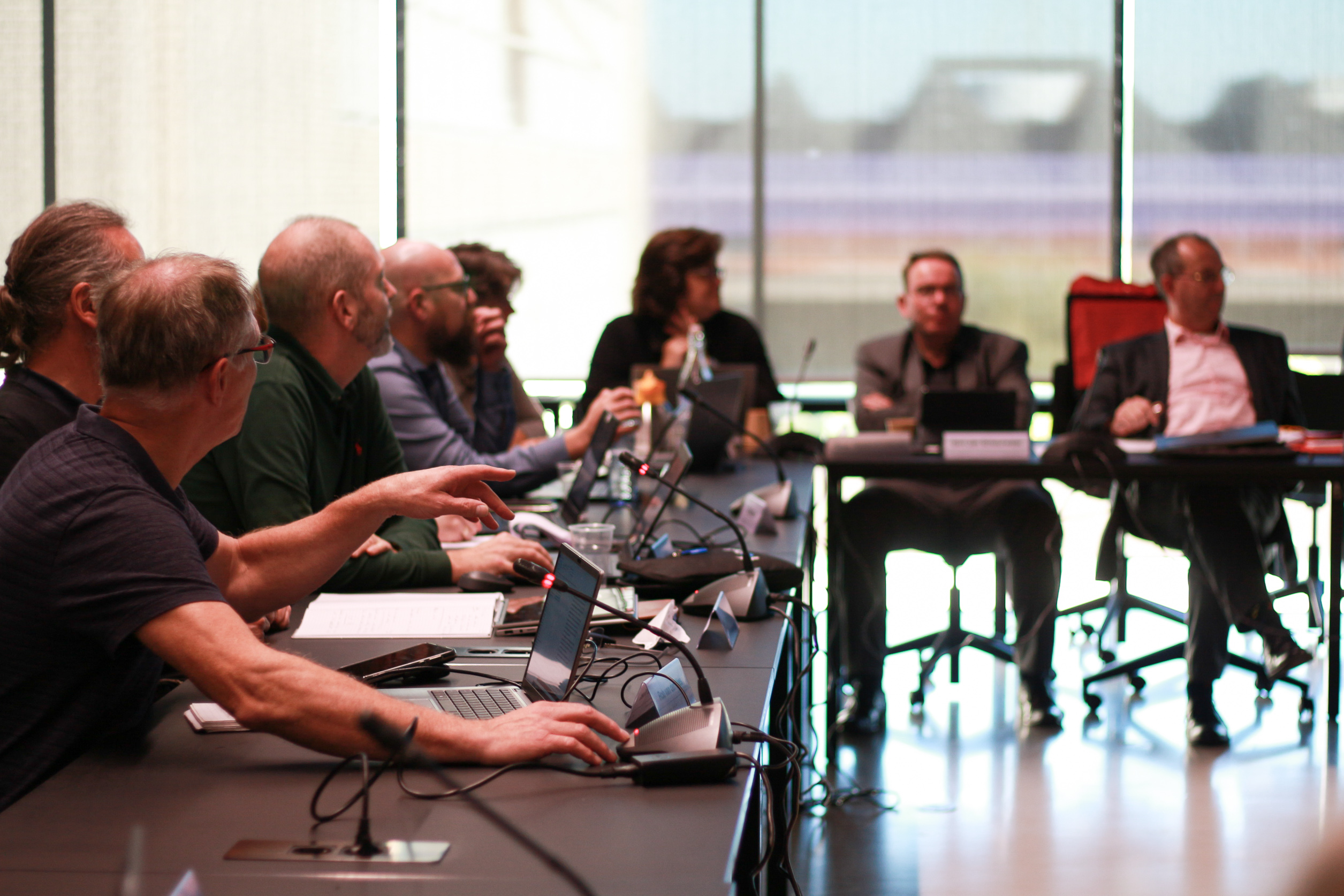Politicians are abandoning employee/student participation to its fate, in the view of Rien Wijnhoven. On Wednesday, he opens a congress on the future of participation bodies.
A TU Delft Works Council meeting with the Executive Board. (Photo: Justyna Botor)
Rien Wijnhoven is at his wits’ end. How can the Education Minister still maintain that everything is fine with employee/student participation in higher education institutions, when there are so many problems? And why are politicians not coming to the aid of the participation bodies?
Wijnhoven is the chair of LOVUM (National Platform of University Participation Bodies), which is organising the congress jointly with VMH (Association of Participation Bodies of Universities of Applied Sciences). In practised fashion, he enumerates the problems. To start with, the participation bodies cannot find many candidates. And when elections take place, an increasingly small number of staff and students vote.
According to the Inspectorate of Education, the uptake at nine universities fell from 32 to 21 percent in the space of four years. The lowest turnout was 6.5 percent. It is even worse at universities of applied sciences. “At big universities of applied sciences like Fontys and Avans only 2 percent of the students vote”, says Wijnhoven. “I would be worried about that if I were an administrator.”
Things do not always go well within the participation bodies either. Only 58 percent of the staff and 65 percent of the students are satisfied with the information provided by their university board, according to a report, and that worries Wijnhoven. “It ought to be close to 100 percent. Information is crucial for a good debate.”
‘We are no longer an accurate reflection of our community’
Meanwhile, politicians are passing the buck to participation bodies. Extra money has to be spent in consultation with staff and student representatives, in many different areas.
What can politicians do to help participation bodies?
“They should talk to us before yet another new regulation is put into effect. The Dutch National Students’ Association (ISO) and the Dutch Student Union (LSVb) are generally consulted, as are the administrators, but we are not. Even though we have to deal with all those regulations. Sometimes it makes you want to tear your hair out.”
Could you give an example?
“Take ‘recognition and reward’. The idea behind it is to reward staff activities differently. It should no longer only be about publications in top journals. We want less competition and more teamwork. Then the Minister comes along with incentive and starting grants for individual researchers, which bucks the trend. Now departments are going to devise ways of getting around it. We could have predicted that, with all our experience.”
Should politicians take participation bodies more seriously?
“I believe so. They now regard us as an extension of our administrators. Consequently, we are always one step behind, which makes us less visible. People then have less motivation to take action and to vote.”
What are the practical obstacles to standing as a candidate for a participation body?
“The remuneration and facilities are very important. Students sometimes fall a year behind with their studies and that can be rather costly. Staff members often have too little time: you can easily spend one day a week on it.”
The House of Representatives has adopted a motion asking for nationwide guidelines.
“Right, but what is being done about it? I haven’t heard anything yet.”
- This time last year, we published this letter to the editor from TU Delft Works Council Chairman Menno Blaauw. According to him, things are better in Delft.
Maybe administrators don’t really see the point?
“I always say: a sensible administrator realises the value of strong participation. Your decisions benefit from it and it increases your support base. In fact, by law, administrators have a duty of care for employee and student participation bodies. If you see that some groups are no longer represented, surely you want to do something about it?”
So are the participation bodies not diverse enough?
“Currently, we are no longer an accurate reflection of our community. We have few PhD students, few internationals and few people of colour in the participation bodies. That doesn’t benefit the debate. Higher education institutions aren’t homogeneous communities and sometimes have differing interests. One gets more, the other gets less, and we all have to discuss it together.”
How can you turn the tide?
“We’re going to discuss that on Wednesday. We’re now in a downward spiral that we have to break as quickly as possible.”
- The congress (in Dutch) ‘The future of participation’, focusing on higher education, will take place on Wednesday 9 November at 13.00 in Utrecht.
HOP, Bas Belleman
Translation: Taalcentrum-VU
Do you have a question or comment about this article?
redactie@hogeronderwijspersbureau.nl


Comments are closed.